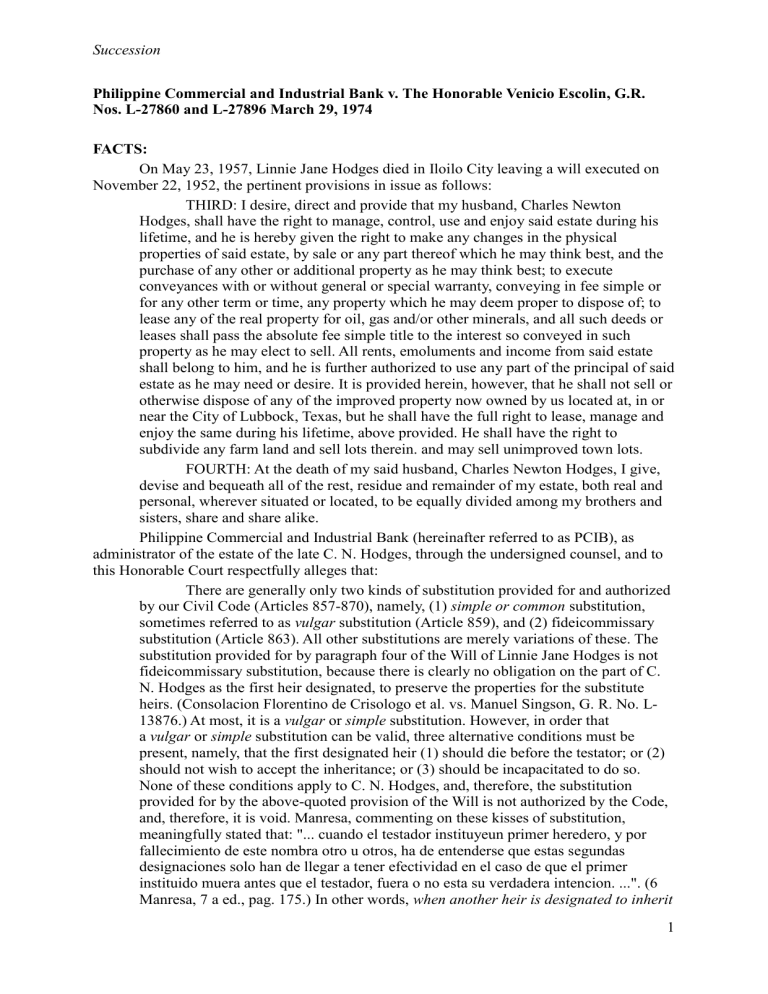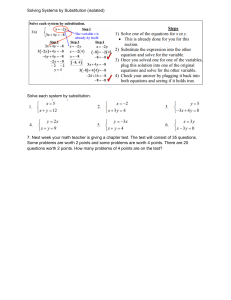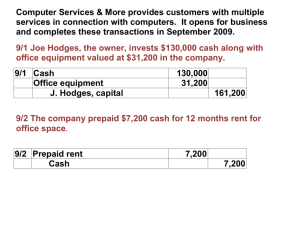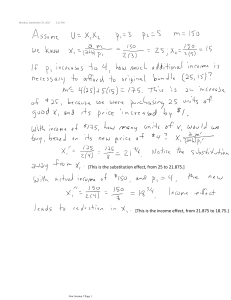Philippine Commercial and Industrial Bank v. The Honorable Venicio Escolin, G.R. Nos. L-27860 and L-27896 March 29, 1974
advertisement

Succession Philippine Commercial and Industrial Bank v. The Honorable Venicio Escolin, G.R. Nos. L-27860 and L-27896 March 29, 1974 FACTS: On May 23, 1957, Linnie Jane Hodges died in Iloilo City leaving a will executed on November 22, 1952, the pertinent provisions in issue as follows: THIRD: I desire, direct and provide that my husband, Charles Newton Hodges, shall have the right to manage, control, use and enjoy said estate during his lifetime, and he is hereby given the right to make any changes in the physical properties of said estate, by sale or any part thereof which he may think best, and the purchase of any other or additional property as he may think best; to execute conveyances with or without general or special warranty, conveying in fee simple or for any other term or time, any property which he may deem proper to dispose of; to lease any of the real property for oil, gas and/or other minerals, and all such deeds or leases shall pass the absolute fee simple title to the interest so conveyed in such property as he may elect to sell. All rents, emoluments and income from said estate shall belong to him, and he is further authorized to use any part of the principal of said estate as he may need or desire. It is provided herein, however, that he shall not sell or otherwise dispose of any of the improved property now owned by us located at, in or near the City of Lubbock, Texas, but he shall have the full right to lease, manage and enjoy the same during his lifetime, above provided. He shall have the right to subdivide any farm land and sell lots therein. and may sell unimproved town lots. FOURTH: At the death of my said husband, Charles Newton Hodges, I give, devise and bequeath all of the rest, residue and remainder of my estate, both real and personal, wherever situated or located, to be equally divided among my brothers and sisters, share and share alike. Philippine Commercial and Industrial Bank (hereinafter referred to as PCIB), as administrator of the estate of the late C. N. Hodges, through the undersigned counsel, and to this Honorable Court respectfully alleges that: There are generally only two kinds of substitution provided for and authorized by our Civil Code (Articles 857-870), namely, (1) simple or common substitution, sometimes referred to as vulgar substitution (Article 859), and (2) fideicommissary substitution (Article 863). All other substitutions are merely variations of these. The substitution provided for by paragraph four of the Will of Linnie Jane Hodges is not fideicommissary substitution, because there is clearly no obligation on the part of C. N. Hodges as the first heir designated, to preserve the properties for the substitute heirs. (Consolacion Florentino de Crisologo et al. vs. Manuel Singson, G. R. No. L13876.) At most, it is a vulgar or simple substitution. However, in order that a vulgar or simple substitution can be valid, three alternative conditions must be present, namely, that the first designated heir (1) should die before the testator; or (2) should not wish to accept the inheritance; or (3) should be incapacitated to do so. None of these conditions apply to C. N. Hodges, and, therefore, the substitution provided for by the above-quoted provision of the Will is not authorized by the Code, and, therefore, it is void. Manresa, commenting on these kisses of substitution, meaningfully stated that: "... cuando el testador instituyeun primer heredero, y por fallecimiento de este nombra otro u otros, ha de entenderse que estas segundas designaciones solo han de llegar a tener efectividad en el caso de que el primer instituido muera antes que el testador, fuera o no esta su verdadera intencion. ...". (6 Manresa, 7 a ed., pag. 175.) In other words, when another heir is designated to inherit 1 Succession upon the death of a first heir, the second designation can have effect only in case the first instituted heir dies before the testator, whether or not that was the true intention of said testator. Since C. N. Hodges did not die before Linnie Jane Hodges, the provision for substitution contained in Linnie Jane Hodges' Willis void. ISSUE: Whether the siblings of Mrs. Hodges are substitutes to Hodges RULING: NO. At this juncture, it may be stated that we are not overlooking the fact that it is PCIB's contention that, viewed as a substitution, the testamentary disposition in favor of Mrs. Hodges' brothers and sisters may not be given effect. To a certain extent, this contention is correct. Indeed, legally speaking, Mrs. Hodges' will provides neither for a simple or vulgar substitution under Article 859 of the Civil Code nor for a fideicommissary substitution under Article 863 thereof. There is no vulgar substitution therein because there is no provision for either (1) predecease of the testator by the designated heir or (2) refusal or (3) incapacity of the latter to accept the inheritance, as required by Article 859; and neither is there a fideicommissary substitution therein because no obligation is imposed thereby upon Hodges to preserve the estate or any part thereof for anyone else. But from these premises, it is not correct to jump to the conclusion, as PCIB does, that the testamentary dispositions in question are therefore inoperative and invalid. The error in PCIB's position lies simply in the fact that it views the said disposition exclusively in the light of substitutions covered by the Civil Code section on that subject, (Section 3, Chapter 2, Title IV, Book III) when it is obvious that substitution occurs only when another heir is appointed in a will "so that he may enter into inheritance in default of the heir originally instituted," (Article 857, id.) and, in the present case, no such possible default is contemplated. The brothers and sisters of Mrs. Hodges are not substitutes for Hodges because, under her will, they are not to inherit what Hodges cannot, would not or may not inherit, but what he would not dispose of from his inheritance; rather, therefore, they are also heirs instituted simultaneously with Hodges, subject, however, to certain conditions, partially resolutory insofar as Hodges was concerned and correspondingly suspensive with reference to his brothers and sisters-in-law. It is partially resolutory, since it bequeaths unto Hodges the whole of her estate to be owned and enjoyed by him as universal and sole heir with absolute dominion over them only during his lifetime, which means that while he could completely and absolutely dispose of any portion thereof inter vivos to anyone other than himself, he was not free to do so mortis causa, and all his rights to what might remain upon his death would cease entirely upon the occurrence of that contingency, inasmuch as the right of his brothers and sisters-in-law to the inheritance, although vested already upon the death of Mrs. Hodges, would automatically become operative upon the occurrence of the death of Hodges in the event of actual existence of any remainder of her estate then. 2



